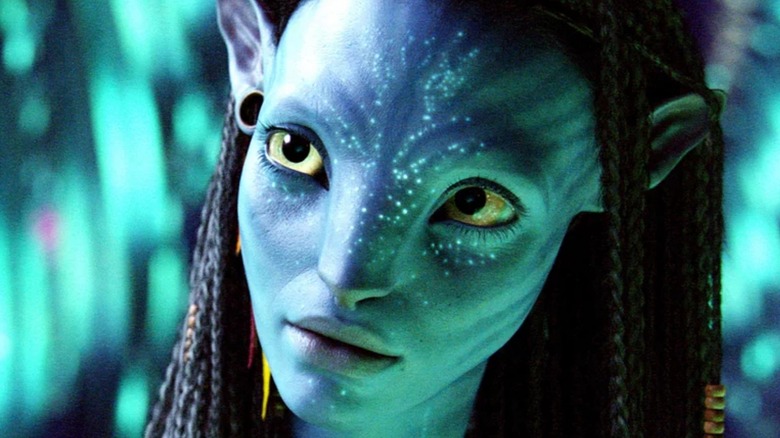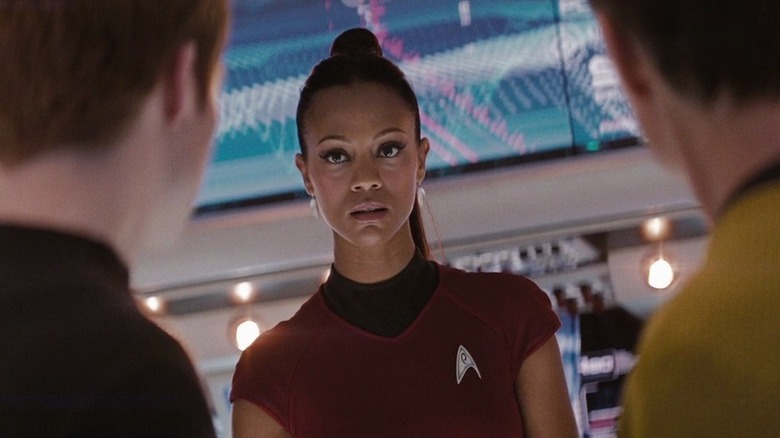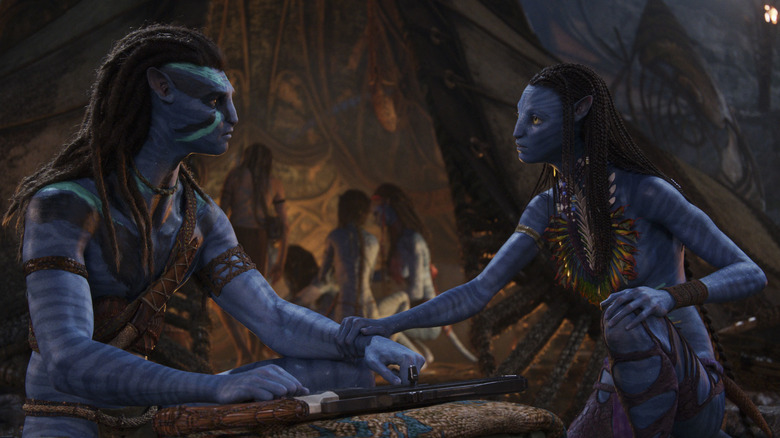Avatar 2's Zoe Saldaña Said Klingon Was Harder To Learn Than Na'vi
The recent premiere of "Avatar: The Way of Water" takes viewers back to Pandora, where we're reminded just how all-encompassing this fictional world actually is. In "Avatar" and its sequel, director James Cameron takes fans on an adventure across a meticulously constructed alien planet. Along with the formerly-human Jake Sully (Sam Worthington), audiences get the chance to learn about the inner workings of Na'vi society. Played by Zoe Saldaña, Neytiri is responsible for Jake's induction into the Omaticaya clan. With Neytiri's help, Jake learns about the Na'vi's hunting style, transportation methods, and their deeply ingrained spiritual connection to the planet. To become fully immersed in their culture, Jake slowly but surely learns the Na'vi language with Neytiri's instruction.
Thankfully, Saldaña is no stranger to learning fabricated languages. She also got to try her hand at Klingon when she played Nyota Uhura in the "Star Trek" reboot. Since these languages were manufactured for entertainment purposes, an actor's conviction and intonation when speaking the lines are important to making them seem authentic within the narrative. However, when it comes to which dialect was harder to learn, the actor's answer was clear. In a recent interview to promote the latest film in the "Avatar" franchise, Saldaña explained why Klingon was the more difficult language to master.
Saldaña had to learn Klingon in a short amount of time
At a glance, it seems as though Klingon would be easy to learn compared to the Na'vi language. As Neytiri, Zoe Saldaña spends a large portion of "Avatar" speaking Na'vi as she lectures Jake on proper pronunciation and the nuances of the dialect. While Uhura only speaks Klingon in a few scenes, Saldaña found the language to be challenging for a few key reasons. When asked which language was more difficult to learn during an interview with Moovy TV, Saldaña explained that learning Klingon was daunting because she had to master her lines in a short amount of time.
"I would say Klingon because I had to learn, you know, the phrases that I was saying so quickly. But it was quite fun, too," Saldaña explained. "You know, when it comes to Na'vi, like there were months and months that we were practicing. And we had Carla Meyer, who worked with Paul Frommer."
With help from Carla Meyer, a dialect coach who worked on both "Avatar" and its sequel, as well as the linguistic expertise of Professor Paul Frommer — who created the Na'vi language — Saldaña was able to wield the constructed vernacular with practiced ease. However, time wasn't the only factor that made learning Klingon troublesome.
The Na'vi language is more flexible than Klingon
Similar to how the Na'vi language was devised specifically for the "Avatar" film franchise, Klingon was created to be spoken by aliens in the "Star Trek" universe. Developed by linguist Marc Okrand for the 1979 film "Star Trek: The Motion Picture," Klingon has been around for decades (via CNN). According to CNN, Okrand pulled sounds from real languages to help make Klingon feel more developed. Since Klingon has been around for a while, mastering the intricacies of a long-established language left little room for error.
During their interview with Moovy TV, Zoe Saldaña's "Avatar" co-star Sam Worthington couldn't help but point out another component that makes Klingon such a difficult vernacular. "[Klingon] has a lot of history, as well," Worthington added. "With Na'vi, if you can't roll your 'r's, they would change the word accordingly to help you."
Saldaña quickly voiced her agreement. "With [Klingon], you really had to get it exactly as it was and that was quite challenging," she concluded.
It doesn't look like Saldaña will have to worry about breaking out her Klingon anytime soon. Her involvement in a fourth "Star Trek" film is currently up in the air, as production has been indefinitely delayed (via The Independent). On the other hand, "Avatar: The Way of Water" is just the first of four planned "Avatar" sequels, so it will be interesting to see how the Na'vi language evolves as the narrative moves forward.


